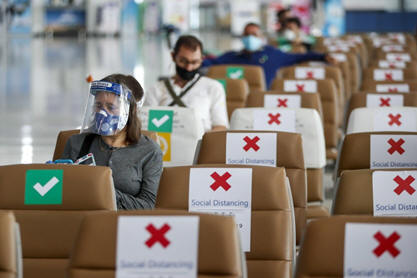www.aljazeerah.info
Opinion Editorials, May 2020
Archives
Mission & Name
Conflict Terminology
Editorials
Gaza Holocaust
Gulf War
Isdood
Islam
News
News Photos
Opinion Editorials
US Foreign Policy (Dr. El-Najjar's Articles)
www.aljazeerah.info
As the US and China Clash, What Can Other Countries Do? By Simon Tay and Jessica Wau Al-Jazeerah, CCUN, May 26, 2020 |
|
 |
|
| Travel at Covid-19 Time, May 2020 |
Neighbours and partners must work to rebuild cross-border trade and boost supply chains as a leadership gap widens during the coronavirus pandemic Lessons can be drawn from the efforts of Asian countries, which signed their own FTAs as a backup plan to global trade when WTO negotiations stalled at the start of the 2000s.
The coronavirus pandemic has been global in reach and impact, yet cooperation has been anything but. National governments largely fend for themselves, for better or worse. The absence of global cooperation is, moreover, not a simple oversight. It is a consequence of US-China rivalry and finger-pointing. Competition was increasing over the past years, framed as a Thucydides trap between rising and incumbent powers. Under President Donald Trump , the United States is often absent but still vehemently asserts its No 1 status. As for China , while Beijing is extending help, there are still concerns about conditional support. All agree that the Covid-19 pandemic has accelerated competition and increased tension.
The question is, what can others do about it? The current assumption is, not much. And this may sadly be right, with little prospect of decisive global cooperation on the coronavirus.
But another question remains: can any good come from the efforts of third countries?
While the US and China are the largest economies, the rest account for some 60 per cent of global GDP. Fighting Covid-19 involves many measures by multiple actors and there is a plethora of areas where win-win cooperation could benefit.
Coronavirus pandemic creates ‘new Cold War’ as US-China relations sink to lowest point in decades
TRADE AND TRUST
Trade has been severely impacted, both in general volume and value, and particularly in relation to medical equipment and food supplies. When the virus first spread, there was a clear sense of panic and declarations of “emergency” covered over many protectionist measures.
There is a need to make trade and supply chains in Asia more resilient. Exporting countries have legitimate concerns about potential scarcities, but there are ways to right-size needs and reassure neighbours and partners that, beyond such concerns, trade will continue.
This approach to rebuild cross-border trade must be applied to essential goods. Additionally, countries must consider ways to reopen borders for travellers, especially businesspeople, as lockdowns begin to ease and commerce restarts.
Seven other countries have since pledged their commitment towards this plurilateral initiative. Trade ministers from Australia, Britain, New Zealand and Singapore also resolved to “lead the world in restoring and deepening global trade”.
While final agreements will take some time, like-minded countries can step forward together. Trust is essential and can be built where there are similar approaches to both economic and health issues, and comparable systems of governance and rule of law.
Larger regional groups can lend support. The Asia-Pacific Economic Cooperation (Apec) trade ministers have issued a formal statement calling for trade to continue. They recognise that emergency measures might be enacted in a crisis, but should be “targeted, proportionate, transparent, temporary”. But Apec as a whole will struggle to do more – its summit has in recent years been captive to Sino-American contention.
Asean leaders similarly took a useful step forward with a special virtual Covid-19 Summit. Few believe it can run ahead – not when larger countries like Indonesia are struggling domestically. But Asean has helped frame China’s help within a broader “plus three” arrangement that includes Japan and South Korea. The group also engaged the US while remaining at some distance from the sharp criticisms that US Secretary of State Mike Pompeo voiced against China. Even coming into the Covid-19 pandemic, the role of Asean was often to provide a baseline of cooperation and to create a more strategic space amid the US-China rivalry, so that dominated and smaller countries need not make an “either-or” choice. That continues and grows more important.
US AND CHINA CAN COME ON BOARD WHEN READY
None of this means the two most powerful countries can be ignored. China continues to donate vast amounts of masks, test kits and PPE, especially to its neighbours. Despite the US domestic situation, the Trump administration will channel a useful US$35 million into Asean for emergency health funding.
The underlying rivalry does resound – when the US president calls Covid-19 the “Chinese virus” , or when Beijing’s aid comes with strings attached, seeking a PR boost. These tensions can worsen, especially with more finger-pointing about the source of the coronavirus. Dividing lines remain about technology choices and the US government’s campaign against Huawei . And there are potential flashpoints over the South China Sea and also Taiwan . All these and more are likely to become even more heated as the US gears up for the coming presidential election .
Yet, other countries must start to look at ways to work together. The expectation is that, without a vaccine, the Covid-19 could remain a factor for years, with subsequent waves of outbreaks. Without China and the US, the helm of global leadership will remain empty. However, the like-minded can begin to help themselves and each other, and these efforts can form a patchwork of necessary initiatives. When conditions allow for trust, these circles can be broadened.
There are precedents. In the aftermath of the Asian financial crisis, a series of bilateral currency arrangements started among the Asean Plus 3 countries. These were later multilateralised and helped stabilise the region when the Global Financial Crisis hit the West. When World Trade Organisation negotiations slowed and stalled at the start of the 2000s, Asian countries began their own free trade agreements (FTAs) as their backup plan to global trade. These have grown, with the largest ones now being the Regional Comprehensive Partnership (RCEP), covering almost all major economies in Asia; and the Comprehensive and Progressive Agreement for Trans-Pacific Partnership (CPTPP), that extends across the Pacific.
Smaller initiatives found these paths first. It was not the giants, but New Zealand and Singapore who signed the earliest bilateral regional trade agreement in 2000. The two countries then tied up with Chile and Brunei to launch the Pacific-4 that later evolved into the CPTPP – a regional FTA that endured even after Trump backed away from it.
Smaller efforts can start and others may join and lead to bigger things. We can all agonise fatalistically about the Sino-American conflict and lack of leadership but fighting Covid-19 deserves, and needs, more hope and initiative.
***
Simon Tay is chairman of the Singapore Institute of International Affairs (SIIA) and associate professor of international law at the National University of Singapore. Jessica Wau is assistant director (Asean) at SIIA. He is a public intellectual as well as an adviser to major corporations and policymakers. He is chairman of the Singapore Institute of International Affairs, an independent and globally ranked think tank. He also teaches international law at the National University of Singapore.
Jessica Wau is assistant director (Asean) at SIIA.
***
Share the link of this article with your facebook friends
|
|
|
|
||
|
||||||




